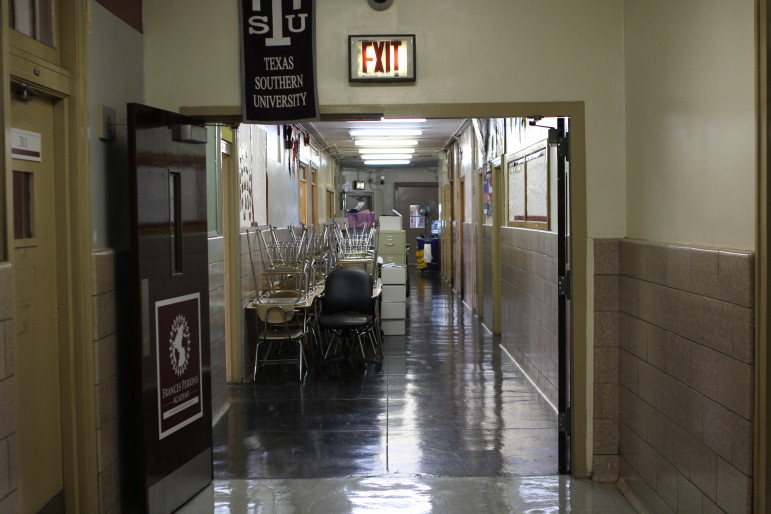
Patrick Donachie
Approximately 20 students would attend classes at Frances Perkins Academy in Greenpoint this summer, with an additional 30 expected during the Regents test prep class.
In the main hallway outside the classrooms of the Frances Perkins Academy in Greenpoint, Brooklyn, the walls were adorned with photos and student work from the school year, and desks, file cabinets and supplies were stacked in rows outside the rooms. The classrooms had been cleared so the floors could be waxed in preparation for Monday, when summer school officially begins at the school.
Principal Kevin Bryant, 33, will oversee the summer session, and says the only certainty about summer school was its unpredictability.
“I tell my teachers they are making 1,000 decisions every single day,” he says.
Frances Perkins enrolls approximately 130 students during the regular school year. This summer, the school will hold classes in math and global studies for high-school students in need of subject accreditation, as well as for students who want to continue their learning over the summer. The school will also host two weeks of intensive test preparation for the Regents exams scheduled for August.
For public-school students, the summer-school process actually begins in the midst of winter. According to the New York City Department of Education, students and families are sent letters in February if the student’s promotion to the next grade is “in doubt.” By the middle of June, students learn whether they will be promoted, and if not, they are instructed to register for summer school. If a student in grades 6-12 requires summer school, according to the DOE. they cannot participate in graduation or stepping-up ceremonies in June. In August, summer school students learn if they will advance to the next grade; if not, parents can appeal the decision to hold a student back.
Bryant said that approximately 20 students would attend classes at Frances Perkins this summer, with an additional 30 expected during the Regents test prep class. Summer enrollment at the school has been steady during Bryant’s tenure, but the city overall has seen a marked decrease in the number of schoolchildren required to attend summer school in recent years. On Wednesday, the DOE announced that approximately 19,400 third-through-eighth graders would require summer school this year. This is down from about 22,500 in 2014, which itself was a decrease from about 32,500 the year before.
Prior to 2014, standardized test scores were the primary factor in deciding whether a student would attend summer school, but schools Chancellor Carmen Fariña and the de Blasio administration instituted a more holistic approach. Principals now examine report card grades, assignments, assessments and test scores to determine if a student is prepared for the next grade.
For those students in danger of being held back, schools create “promotion portfolios” that consist of a student’s classwork and additional assessments. According to the DOE, these assessments “align to the Common Core Learning Standards and focus on determining whether students are ready for the work of the next grade in English language arts and math.” With these portfolios, principals determine if a student needs to complete classes during summer.
This summer, the students at Frances Perkins Academy will be high schoolers, and thus course subject accreditation, rather than promotion to the next grade, will be the focus. Each student will complete a diagnostic test at the start of classes, and their teacher will determine whether they have passed the class by reviewing classwork, assessments and the student’s class attendance.
“What are the standards that will show that they’ve achieved what was needed in the class?” Bryant says when describing the process. “You have to trust in your teacher to make those critical decisions.”
While Bryant says that many students understand the value in continuing their education during the summer, he also said that summer employment could hinder students trying to keep up the necessary level of attendance.
“You have kids who work,” he says. “Sometimes they have to support their families.”
Bryant says he couldn’t be sure how significantly summer school counteracted summer learning loss. It was difficult, he notes, to know how circumstances outside of school would affect students before the start of the new school year.
“If a student is here in summer school, but has a family crisis before regular school, that won’t show up” in an analysis of their progress, he said.
Research suggests that summer school can have a positive impact, according to Catherine Augustine, a senior policy researcher for the Rand Corporation. However, like much of the research regarding summer learning, the analysis comes with caveats.
“We’ve found that remedial programs for younger students do help,” she says. “If they’re engaged in math and reading, and passing the test at the end of the summer, you can assume that they are not losing ground over the summer, that they are not further behind than their peers.”
But high-school students require course accreditation in summer classes, which makes it difficult to know whether those classes stemmed summer learning loss. Still, Augustine said that the classes benefitted students’ chances to graduate.
“Kids are more likely to graduate if they take those classes,” she said.
But on Monday, classes commence at Frances Perkins Academy (throughout much of the city, summer classes started last Wednesday). The floors will be waxed, the lesson plans finalized, and with the incoming students comes the unpredictability of a new school year, despite a start date in July.
“It’s a lot of work to do,” Bryant says, “and no day is ever the same.”
Summer vacation is a time of worry for teachers, principals, parents and policymakers who fear that students will lose ground during the long break. This summer, City Limits will look every week at some aspect of the citywide, summer-long effort to stop the summer slide.







